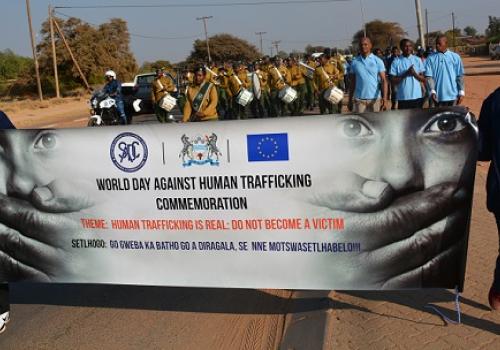The Southern African Development Community has made significant progress towards criminalising trafficking in persons. The criminal activity has become a public security concern in southern Africa, as it has around the world, where it is believed to be a lucrative business for traffickers who thrive on the exploitation of fellow human beings. Having either signed, ratified and/or acceded to international legislative frameworks such as the United Nations Convention against Transnational Organised Crime and its supplementing Protocol to Prevent, Suppress and Punish Trafficking in Persons, especially Women and Children, efforts have been geared towards their domestication through legislation development. To date, 13 of the 15 SADC member countries have stand-alone legislation on the crime, evidence that the region is concerned by the increasing incidences of trafficking in persons' cases. The Democratic Republic of Congo and Namibia are the remaining countries that are yet to enact trafficking in persons-specific legislation, although the wheels are already in motion to enact such legislation.
In its efforts to support Member States in preventing and combating this complex crime, the SADC Secretariat is implementing a four year programme that seeks to raise awareness, cooperation and action against trafficking in persons in the region. This is in line with the implementation of the 10 Year SADC Strategic Plan of Action on Combating Trafficking in Persons, especially Women and Children (2009-2019). The Strategic Plan of Action, adopted in 2009, underwent a mid-term review in order to recast the strategic direction taken by the regional bloc in preventing and combating trafficking in persons. It is anticipated that the Revised Strategic Plan of Action will be adopted by the Ministerial Committee of the Organ (MCO) on Politics, Defence and Security Cooperation by the end of 2017.
Through its Regional Political Cooperation (RPC) Programme, the SADC Secretariat has supported several member states in developing principal and subordinate legislation on trafficking in persons, and in implementing awareness raising, research, and data management activities on the crime. Training of key stakeholders that include law enforcement agencies, social service organisations and the media has also been conducted both at the regional and national levels in order to strengthen the capacity of Member States to respond to trafficking in persons effectively. In addition, awareness raising campaigns on the crime have been conducted in Member States largely supported by, among others, SADC Secretariat, United Nations Office on Drugs and Crime (UNODC) and International Organisation for Migration (IOM).
The need for awareness raising was also recognised by the United Nations General Assembly who, in 2013, proclaimed the 30th July every year as the World Day against Trafficking in Persons with the main purpose of raising “awareness of the situation of human trafficking and for the promotion and protection of their rights.” Research and information sharing on trafficking in persons was also identified as a strategic intervention in the Strategic Plan of Action adopted in 2009, as it informs appropriate policy development and implementation. In response, the SADC Secretariat commissioned a research in 2014 to understand “the nature, extent and impacts of trafficking in persons in the SADC region.” The research unearthed significant data gaps on trafficking in persons. However, it was generally acknowledged that women and girls are the most vulnerable groups to trafficking in persons in the SADC region, while poverty, unemployment and lack of income-generating opportunities are the significant push factors driving the crime in the region.
The publication, titled Trafficking in Persons in the SADC Region: a baseline report, recommended that more in-depth national and regional researches and situational assessments on trafficking in persons should be conducted. The baseline report was launched in August 2016 on the margins of the SADC Summit of Heads of States and Governments in Swaziland.
While SADC has made significant progress in criminalising trafficking in persons, there still remains a lot that needs to be done for the region to be safe from such transnational organised crime. The remaining years of implementation of the 10 Year SADC Strategic Plan of Action on Combating Trafficking in Persons, especially Women and Children (2009-2019) are, therefore, critical towards ensuring successful response to the crime in the region. In addition, while legislation on the crime is in existence in 13 of the 16 Member States, it is important that such legislation is effectively enforced.
SADC Member States, therefore, have a huge task to ensure legislation enforcement, as well as improving the capacity of law enforcement agencies and other key stakeholders on trafficking in persons, and the Secretariat’s role in this cannot be emphasised more.
| Attachment | Size |
|---|---|
| SADC_Member_States_progress_in_developing_national_anti-TIP_legislation.pdf | 195.04 KB |

